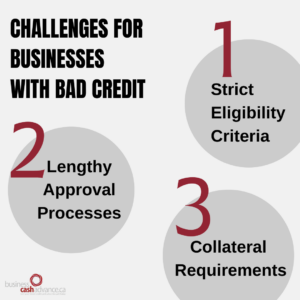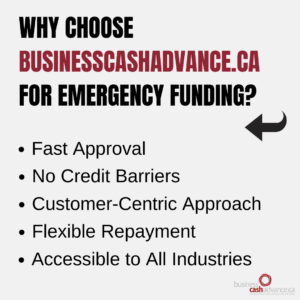Emergency Funding Options for Canadian Businesses with Bad Credit
Running a business can be unpredictable. Unexpected financial crises whether due to economic downturns, supply chain disruptions, or unforeseen expenses can put immense strain on your operations. For Canadian businesses, securing funding during these critical moments is challenging, especially for those with bad credit. Thankfully, there are emergency funding options tailored to such scenarios, offering quick solutions without rigid credit requirements.
In this article, we’ll explore how businesses with bad credit can access funds urgently through options like merchant cash advances, invoice factoring, and payday loans for businesses. We’ll also highlight why BusinessCashAdvance.ca is a reliable partner for emergency funding.
Why Emergency Funding is Critical for Businesses
In times of financial hardship, access to emergency funding can mean the difference between survival and closure. Here’s why:
- Cash Flow Management: Many businesses face temporary cash shortages, particularly during off-seasons or unexpected downturns.
- Covering Operational Costs: Expenses such as payroll, rent, and utility bills don’t pause during crises.
- Seizing Opportunities: Emergency funds can help capitalize on time-sensitive growth opportunities, such as bulk discounts or new contracts.
Challenges for Businesses with Bad Credit

For businesses with poor credit histories, traditional loans from banks are often unattainable due to:
- Strict Eligibility Criteria: Banks require high credit scores, lengthy business histories, and extensive documentation.
- Lengthy Approval Processes: When time is critical, waiting weeks or months for approval isn’t viable.
- Collateral Requirements: Many small businesses lack the assets needed to secure traditional loans.
Emergency Funding Options for Businesses with Bad Credit
Let’s examine alternative funding solutions designed for businesses needing immediate cash flow support:
1. Merchant Cash Advances (MCAs)
Merchant cash advances are a popular option for businesses with fluctuating sales, especially those that process credit card payments.
How They Work:
- A lump sum is provided upfront.
- Repayment is made via a percentage of daily sales or credit card transactions.
Advantages:
- No strict credit requirements; approval is based on sales performance.
- Quick access to funds, often within 24–48 hours.
- Payments adjust with revenue, offering flexibility during slow periods.
Best For:
- Retail businesses, restaurants, and service providers with steady credit card sales.
Example: A restaurant facing low cash flow during the off-season could use an MCA to cover payroll and operational costs, repaying as sales recover.
2. Invoice Factoring
Invoice factoring involves selling unpaid invoices to a factoring company in exchange for immediate cash.
How It Works:
- A business sells its accounts receivable at a discount.
- The factoring company collects payment from the customer when the invoice is due.
Advantages:
- Fast approval based on the strength of your customers’ creditworthiness, not your business’s credit score.
- Immediate cash to bridge gaps in working capital.
- No additional debt, as this is a sale rather than a loan.
Best For:
- B2B businesses with outstanding invoices, such as wholesalers and service providers.
Example: A logistics company awaiting payment from a corporate client can use invoice factoring to maintain cash flow without waiting 30–90 days for invoice clearance.
3. Payday Loans for Businesses
Payday loans for businesses are short-term, high-interest loans designed for urgent financial needs.
How They Work:
- Businesses receive a small loan, repaid within weeks or months.
Advantages:
- Minimal credit checks, making it accessible for businesses with bad credit.
- Funds are disbursed quickly, often the same day.
Disadvantages:
- High-interest rates and fees, making them a costly option.
Best For:
- Emergency situations where funding is needed immediately, and repayment can be guaranteed within a short period.
Example: A small retailer needing to restock inventory before a holiday rush may use a payday loan to ensure shelves are full.
4. Business Lines of Credit (for Bad Credit)
A business line of credit provides ongoing access to funds up to a predetermined limit, allowing businesses to draw only what they need.
How It Works:
- Funds are withdrawn as needed and repaid with interest on the amount used.
Advantages:
- Flexible, revolving credit for continuous cash flow management.
- Less stringent credit requirements with some alternative lenders.
Best For:
- Businesses requiring regular access to cash for small, recurring expenses.
Example: A freelancer with fluctuating income could use a line of credit to manage operational expenses during slow months.
5. Equipment Financing
For businesses needing funds to replace or upgrade equipment, equipment financing provides a viable option.
How It Works:
- The equipment itself serves as collateral for the loan.
Advantages:
- Accessible to businesses with poor credit, as lenders focus on the equipment’s value.
- Spreads out the cost of expensive purchases over time.
Best For:
- Construction companies, manufacturers, or other businesses reliant on costly machinery.
Example: A bakery needing a new oven could use equipment financing to avoid depleting working capital.
Why Choose BusinessCashAdvance.ca for Emergency Funding?

When time and flexibility are of the essence, BusinessCashAdvance.ca stands out as a reliable funding partner for Canadian businesses. Here’s why:
- Fast Approval: Applications are streamlined, with decisions often made within hours.
- No Credit Barriers: Unlike traditional lenders, approval is based on business performance rather than credit scores.
- Flexible Repayment: Repayments adjust to your revenue, ensuring cash flow stability during challenging times.
- Accessible to All Industries: Whether you run a restaurant, retail store, or service business, BusinessCashAdvance.ca offers tailored solutions.
- Customer-Centric Approach: Dedicated support ensures businesses receive guidance throughout the process.
Comparing Emergency Funding Options
| Option | Funding Speed | Credit Requirements | Repayment Flexibility | Cost | Best For |
| Merchant Cash Advance | 24–48 hours | Low | High | Moderate to High | Businesses with fluctuating sales. |
| Invoice Factoring | 24–72 hours | None (based on customers’ credit) | Medium | Moderate | B2B businesses with unpaid invoices. |
| Payday Loans | Same day | Very low | Low | High | Short-term, urgent needs. |
| Business Line of Credit | 1–3 days | Moderate | High | Moderate | Recurring expenses or emergencies. |
| Equipment Financing | 1–2 weeks | Moderate | Medium | Low to Moderate | Equipment-heavy businesses. |
Factors to Consider When Choosing Emergency Funding
When selecting an emergency funding option, consider the following:
- Urgency: How quickly do you need the funds?
- Cost: What is the total cost, including interest and fees?
- Repayment Capacity: Can your business handle the repayment structure?
- Credit Impact: Will the option affect your credit score positively or negatively?
- Business Type: Does the option align with your industry and revenue model?
Frequently Asked Questions
- Can businesses with bad credit still access emergency funding?
Yes, options like merchant cash advances and invoice factoring focus on revenue and customer creditworthiness rather than your credit score. - How fast can I receive funds through BusinessCashAdvance.ca?
Funds can be disbursed within 24–48 hours, making it one of the fastest options available. - Are there risks to using payday loans for businesses?
Yes, payday loans come with high-interest rates, making them a last-resort option. Consider other alternatives first. - What makes invoice factoring different from loans?
Invoice factoring involves selling receivables, so it’s not a loan. This means no debt is added to your balance sheet. - How do repayments work for merchant cash advances?
Repayments are a fixed percentage of daily or weekly sales, adjusting automatically based on your revenue. - Is collateral required for emergency funding options?
Most options, like merchant cash advances and payday loans, do not require collateral.
Conclusion
For Canadian businesses facing financial crises, having access to the right funding option is crucial. While bad credit can limit traditional financing routes, alternative solutions like merchant cash advances, invoice factoring, and payday loans provide quick, accessible options.
Among these, BusinessCashAdvance.ca offers unmatched reliability, speed, and flexibility, making it an excellent choice for businesses in need. By understanding your financial needs and exploring the right funding strategies, you can navigate challenges and keep your business thriving.









